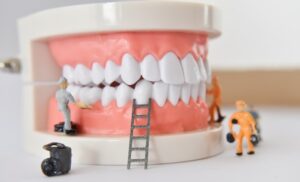What Are Dental Implants?
 A dental implant procedure is performed as an outpatient treatment and requires the placement of prosthetic tooth roots. These implants fuse with your jawbone, allowing your dentist or oral surgeon to set crowns, which are replacement teeth. If one or more permanent teeth are missing, dental implants may be an option for you.
A dental implant procedure is performed as an outpatient treatment and requires the placement of prosthetic tooth roots. These implants fuse with your jawbone, allowing your dentist or oral surgeon to set crowns, which are replacement teeth. If one or more permanent teeth are missing, dental implants may be an option for you.
The implant is composed of titanium and other components that bond with your jawbone to resemble a tooth root. This artificial root enables your dentist to anchor your replacement teeth so that they feel secure and integrate with your natural teeth. Implants are designed to mimic the appearance, feel, and function of your natural teeth.
How to Prepare for Dental Implants
Because dental implants necessitate one or more surgical operations, you must prepare for the treatment, which should include the following:
• Location – Dental care is usually conducted in a dental clinic by a team of oral surgeons and restorative dentistry professionals. A full dental checkup, a review of your medical history, and a treatment plan should all be expected prior to surgery.
• Food and Drink – You can eat a small meal a couple of hours before the surgery if you’re getting a local anesthetic. If you’re having the procedure done under IV sedation, you’ll be told not to eat anything after midnight the night before so your stomach is empty.
• Medication – To prevent early implant failure, your dentist may prescribe antibiotics to take for a few days before surgery. They may also recommend that you rinse with an antibacterial mouthwash like chlorhexidine.
• Pre-Op Lifestyle Changes – Because smoking slows healing, it may reduce the success of dental implants. If you smoke, talk to your dentist about whether dental implants are right for you.
What to Expect During the Procedure?
The dental implant surgery is completed in a series of appointments spaced many months apart. Your mouth will be properly numbed with local anesthetic or IV sedation during the first phase so you won’t feel any pain or discomfort. Your dentist will utilize a drill to create space in the bone for the implant screw once the incision is in place. Don’t panic, the drill is really quiet, so if you stay awake during the procedure, you won’t be surprised or frightened.
After a few months of recuperation, the patient should return for their second treatment. The healing period allows the bone to grow around the implant and permanently fuse to the jawbone.
The dentist will assess whether the implant is secure enough for the abutment, which will hold the replacement tooth. If everything happens according to plan, the implant is then re-exposed through a new incision so your provider can take impressions of your teeth and manufacture a replacement tooth, often known as a crown. Finally, the crown is perfectly fit and secured to the abutment.
Recovery and Aftercare
The amount of time it takes for a patient to recover differs from one to the next. If you only needed one tooth extracted and replaced, your recovery period will be substantially shorter than if you needed multiple implants and a bone graft. After surgery, most people have bruising, swelling, and some localized pain. To compensate for any discomfort in the gums and mouth, brush your teeth carefully. Using ice packs and warm, wet washcloths at various periods throughout the day can also help to reduce swelling and tenderness. Even if you aren’t feeling your best, you can return to work the next day.
Schedule an appointment with Gio Dental at Station Landing. Our Medford dentist will guide you through caries prevention and dental implant treatment.

